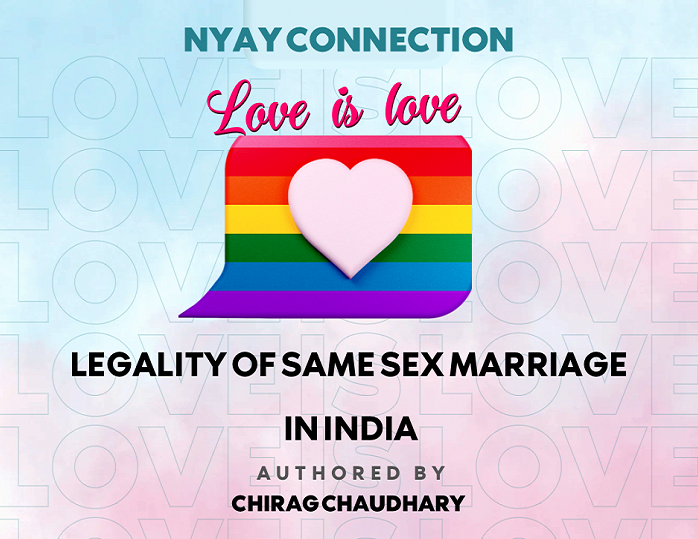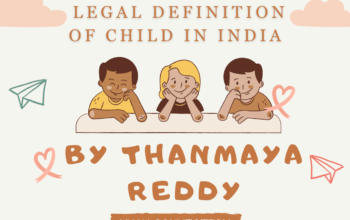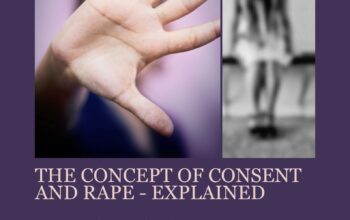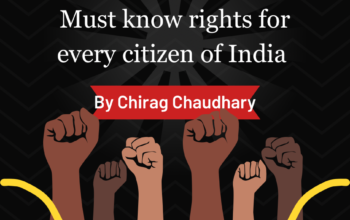The rise in lesbian, gay, bisexual and transgender individual’s their rights and acknowledgement have been evolving rapidly in recent years. Within this globalisation era where LGBTQ individuals enjoy several personal rights, there are some countries where they face a challenge for their survival and being in a bond of togetherness i.e. marriages. The reference of LGBTQ individuals in India can be traced back to the time of Mahabharata, Bahuchara Mata in the literature of Kamasutra and Manusmriti. The Hindu Khajuraho temples depict the erotic sculptures containing several depictions of homosexual activities. Hinduism has traditionally portrayed homosexuality as natural but some texts do contain injunctions against homosexuality. During the Mughal Empire there were several types of punishments for homosexuality. The major criminalisation of homosexuality was enacted by section 377 of Indian Penal Code by the British Rule which came into force in 1861.
INTRODUCTION
In India legality of same sex marriage is a deep study of human relationships and understanding the concept of marriage which is termed as a Sacred Union, a Sacrament and a Sanskar. Same sex marriage is the marriage either between two men or two women. In most countries same sex marriage are constrained by legal and religious cultural norms. A total of 34 nations have legalised same sex marriage as of 2023 constituting around 17% of world’s population. According to the Indian government the Supreme Court’s 2018 decision in Navtej Singh Johar case simply decriminalised same sex sexual activity but has not legalised it. The apex court had never recognised same sex marriages despite decriminalising homosexuality. The special marriage act of 1954 also recognises the interfaith and inter caste marriages not same sex marriages. The legal status of same sex marriages in India remains unclear with religious and governmental opposition.
MARRIAGE LAWS IN INDIA
Marriage is an institution that binds two people together for eternity. India is a secular country where people have a constitutional right to follow any religion as per their desire. There are different religious personal laws that lay down marriage laws in India. There is no single uniform code of law for marriage, rather we have different laws for different religions like-
- For Hindu we have, The Hindu marriage act, 1955
- For Muslim the Muslim Personal Law (Shariat) Application Act 1937
- For Christian and Parsi, The Indian Christian Marriage Act, 1872 and The Parsi Marriage and Divorce Act, 1936 respectively.
- For the one who doesn’t profess any religion we have The Special Marriage Act, 1954 to govern their marriage.
SECTION 377 AND RIGHTS OF LGBTQ+
Section 377 of the Indian Penal Code is a section of the Indian Penal Code introduced in 1861 during the British rule of India.It makes sexual activities “against the order of nature” illegal. On 6 September 2018, the Supreme Court of India ruled that the application of Section 377 to consensual homosexual sex between adults was unconstitutional, “irrational, indefensible and manifestly arbitrary”,but that Section 377 remains in force relating to sex with minors, non-consensual sexual acts, and bestiality. On 24 August 2017, the Supreme Court upheld the right to privacy as a fundamental right under the Constitution in the landmark Puttaswamy judgement. The Court also called for equality and condemned discrimination, stating that the protection of sexual orientation lies at the core of the fundamental rights and that the rights of the LGBT population are real and founded on constitutional doctrine.
In January 2018, the Supreme Court agreed to hear a petition to revisit the 2013 Naz Foundation judgement. On 6 September 2018, the Court ruled unanimously in Navtej Singh Johar v. Union of India that Section 377 was unconstitutional “in so far as it criminalises consensual sexual conduct between adults of the same sex”.The judgement was given by a five judges bench comprising the then Chief Justice of India Dipak Misra, Justices R. F. Nariman, D. Y. Chandrachud, A. M. Khanwilkar and Indu Malhotra referring to article 15 of the Constitution of India states, Prohibition of discrimination on grounds of religion, race, caste, sex or place of birth.
The Transgender Persons (Protection of Rights) Act, 2019 bans discrimination against transgender people in educational establishment and services, employment, healthcare services, access to the “use of any goods, accommodation, service, facility, benefit, privilege or opportunity dedicated to the use of the general public or customarily available to the public”, the right to movement, the right to “reside, purchase, rent or otherwise occupy any property”, the opportunity to stand for or hold public or private office, and in government or private establishments.
CURRENT CASE STATUS OF SAME SEX MARRIAGE
The Supreme court five judge constitution bench in a path breaking unanimous verdict delivered on sept 6, 2018 held that consensual sex among adult LGBT individuals in a private place is not a crime while decriminalising section 377 of Indian Penal Code as a part of their fundamental rights. It has said the 158 year old law had become an odious weapon to harass the LGBT community by subjecting its members to discrimination and equal treatment. In response to this decision a total of 150 petitions were filed at different courts. The apex court took cognizance of these petitions, clubbed them and transferred to itself. The SC is scheduled to hear a batch of pleas seeking legal validation for same sex marriages on March 13, 2023 before a bench comprising chief justice DY Chandrachud and justices PS Narasimha and JB Pariwala.
CONCLUSION
People who belong to LGBT community are also human beings like others so they do not need to justify themselves because of their gender attraction. If two people want to happily live together with their consent, it’s their right.The rights are given in our constitution equal for each one no matter they are man, women, and transgender they all are not only having the equal rights but also have protection against the discrimination on the basis of sex is prohibited as under Art. 14, 15, 19(1)(a) and 21 of the Indian Constitution. “My life, my choice, my partner with consent”,slogan states that they also have the right to live with pride so, meanwhile everyone has a natural right as a human being to live with dignity in our society whether they are men, women or transgender without any restrictions.
This article is written by Chirag Godhar. He is a legal associate working in Delhi and can be reached at chirag619chaudhary@gmail.com for feedback relating to the article.
If you are also a law student or legal professional and wish to contribute to the website, you may send your submission at nyayconnection@gmail.com.




